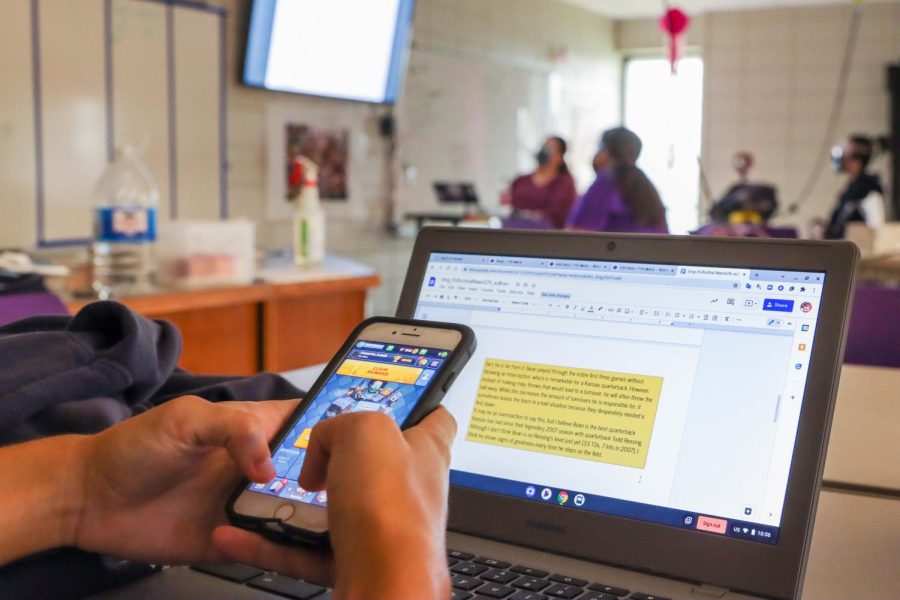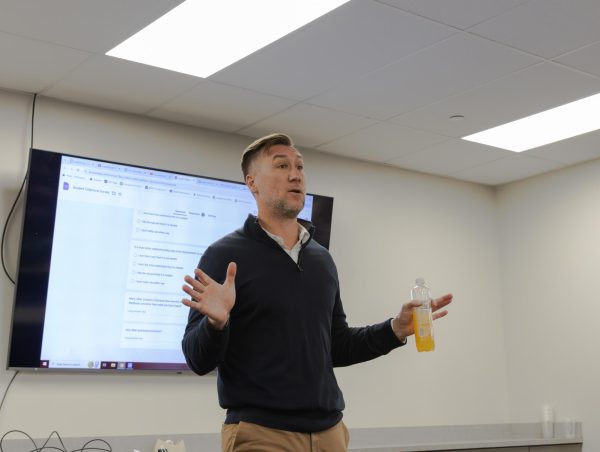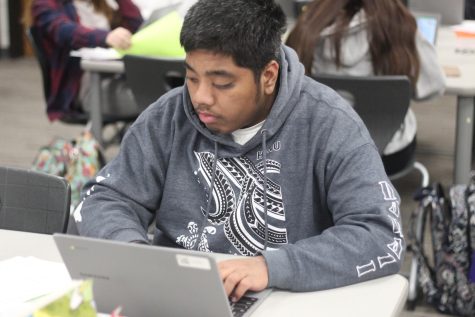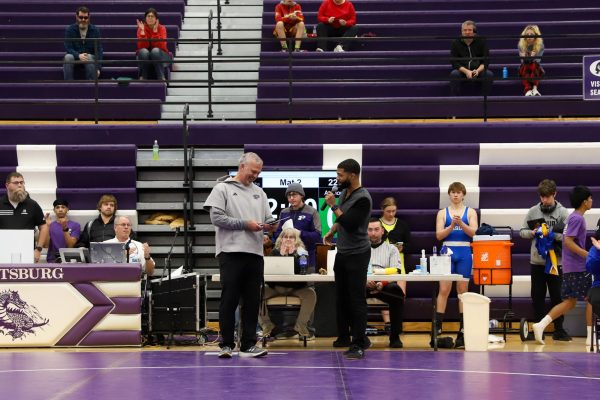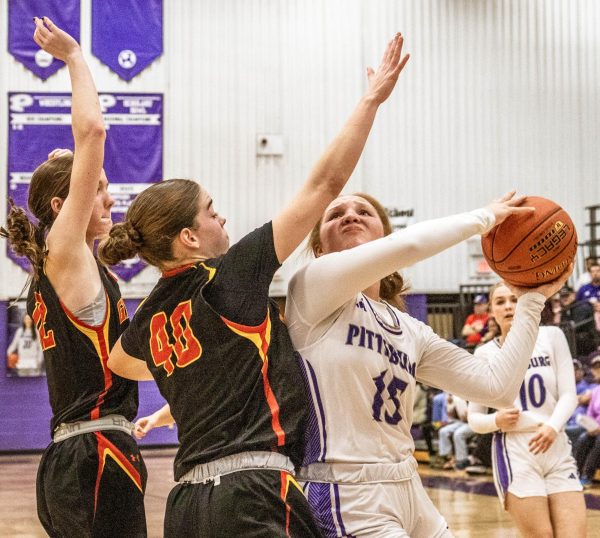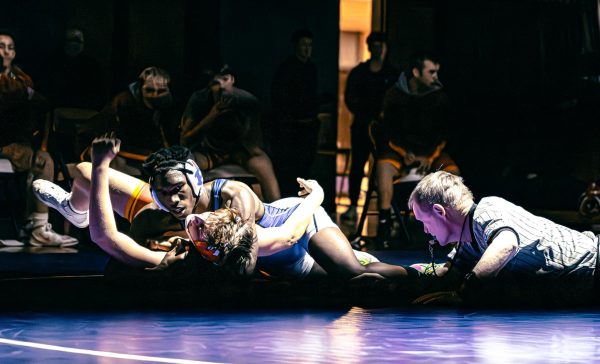Distracted Learning
Students and staff talk class distractions
Photo by: Francisco Castaneda
A student in class is playing Clash Royale rather than paying attention to the class lecture.
As English teacher Abbey Cummings presents with the lights off as students take notes, at the side of her eye, she notices a flash coming from a student’s phone when they receive a notification. The phone lighting up the classroom like a strobe light, that is an example where Cummings feels annoyed when it comes to teaching.
This is Cummings’ 22nd year teaching at Pittsburg High School, when she sees kids on their phones, or they are not paying attention to what she’s doing, that is something that makes her feel distracted when she is teaching.
“I notice that there are other people in the room talking or if they’re on their phones,” Cummings said.
For Spanish teacher Jessica Mildfelt, she gets distracted when she receives notifications from her devices, from loud noises from the hallway, and when students cause distractions.
“My phone, Apple Watch, and computer when they get notifications to distract me,” Mildfelt said. “Same with loud noises from the hallway and when students are cause distractions by talking, making jokes, or telling stories.”
In class, Samantha Taylor gets distracted when people talk or don’t understand basic social cues of staying quiet in class, but she tends to find ways to avoid distractions like heading to the library to work.
“[I] go to the library, take a deep breathe and talk to myself; I tell myself “focus, Sammy,” Taylor said.
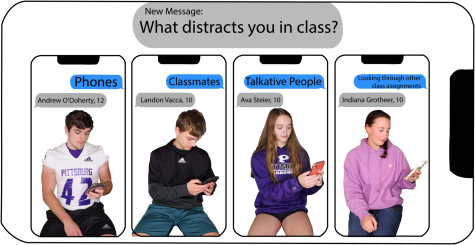
Junior Jack Stefnaoni, does not deal well with distractions very well. The main thing that distracts him is social media, but he also gets distracted depending on the class, students can create different dynamics which can also depend on different types of distractions. When Stefanoni is struggling to find ways to get his assignments done, he creates his own challenges to finish his assignments.
“What keeps me focused is the deadline,” Stefanoni said. “Typically I’ll just find a good reason in my mind to stay focused, I’ll just create my own little challenges and repercussions.
Stefanoni believes that he has issues with procrastination and distraction, When he went through middle school and elementary school, it was easy but when he enrolled in more difficult classes, he found it harder for him to stay focused.
“I think one of the reasons I have issues with procrastination and distractions, is because I went through middle school and elementary school fairly easily.” Stefanoni said. “It wasn’t super difficult, so when I started choosing to take hard classes in high school, I started having to actually do a bunch of stuff, I wasn’t really prepared and I didn’t have a really good work ethic, so that kind of set me back a bit.”
When students are disruptive, it is a major pet peeve for Cummings. For Mildfelt, she sometimes feels like she is not appreciated when she teaches and students are on their devices in class.
“[I think it’s rude when people are], talking while I’m teaching or being on their technology while I’m teaching,” Mildfelt said. “Everything I do in the classroom is so they can learn and sometimes it feels unappreciated.”
When finding ways to remove distractions from students, Mildfelt attempts to take away electronics from students or pulling students out of class to discuss the issue. Cummings asks students to put their phones away at the beginning of class, but if it begins to become an issue, she asks the students to put their phones on their desks.
“I have them put their phones away at the beginning of class and if I see that they’re out when it’s not an appropriate time, I ask them to put it away again or put it on my desk,” Cummings said.
Mildfelt believes that it is important for students to learn about what distracts them and ways to avoid being distracted.
“As young adults, I feel it is important for students to learn what distracts them and take precautions as to not get distracted. If the phone continuously becomes an issue we talk about it and then decide a plan of action,” Mildfelt said. “Does it need to go to my desk for class? Should it stay in the backpack? They need to learn how to live with the distractions just like all of us do.”
Your donation will support the student journalists of Pittsburg High School - KS. Your contribution will allow us to purchase equipment and cover our annual website hosting costs.
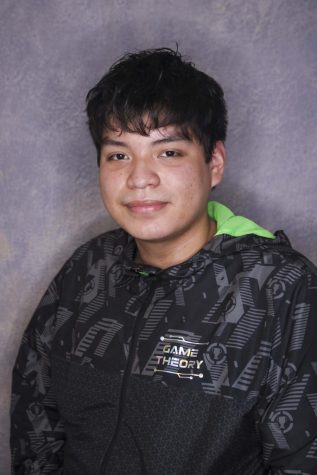
This is Francisco’s third year being involved with photojournalism and his first part of being involved in yearbook. Francisco is also involved in Key...


